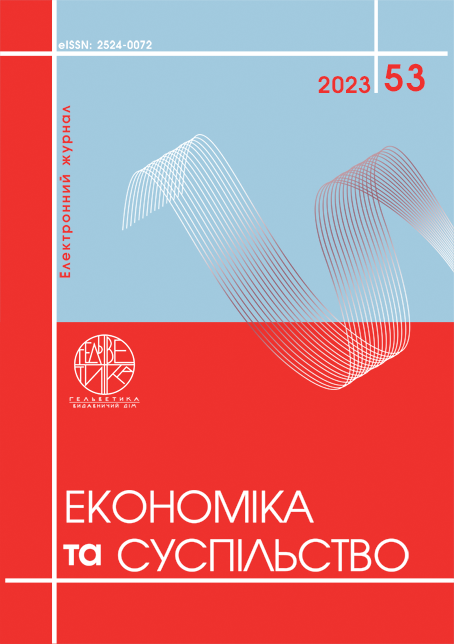MODIFICATION OF TOOLS FOR FORENSIC ECONOMIC EXAMINATION OF FINANCIAL FRAUD
Abstract
The article is devoted to the problem of developing tools for forensic economic expertise to prevent and combat fraud. Analyzed the international experience of using forensic accountants to counter fraud. The influence of the tasks of detecting fraud in the pre-trial investigation and the trial on the organization of the forensic economic examination has been revealed. It is proposed to modify the methods of forensic economic examination in the direction of their application to detect financial fraud. An innovative model has been developed that provides for the integration of the technique of conducting a forensic economic examination with the methods of accounting, analysis, and audit. The model provides for the differentiation of fraud prevention processes embedded in it into two groups. The first group includes the process of preliminary investigation to determine the credibility of the suspicion of fraud. Modeling provides an algorithm of actions when fraud is not detected, which should be reflected in the expert opinion. The processes of the second group reflect the circumstances of the identified fraud and their analysis, followed by reporting in the form of an expert opinion. The study made it possible to reveal the use of forensic economic examination tools at each stage of its implementation. The model takes into account the stages of identifying and examining financial evidence to establish a reliable base on a suspected transaction, assessing the quality of evidence, collecting relevant data using relevant software, evidence, providing an expert opinion, which will help in considering the objectives of the investigation or other parties. It has been determined that the assessment by forensic experts of the ability of the company's internal control system to prevent fraud through risk management tools will provide greater confidence in the reliability of evidence of financial fraud. The novelty of the work lies in the inclusion in the model of forensic economic examination of the elements of internal control of the company where the investigation takes place, which can prevent potential fraudulent schemes. The practical significance of the study results lies in the possibility of applying the forensic economics model to provide a reliable solution to prevent fraud.
References
Alzoubi, A.B. (2023). Maximizing internal control effectiveness: the synergy between forensic accounting and corporate governance. Journal of Financial Reporting and Accounting, Vol. ahead-of-print No. ahead-of-print. DOI: https://doi.org/10.1108/JFRA-03-2023-0140
Nunn, L., McGuire, B.L., Whitcomb, C. and Jost, E. (2006). Forensic accountants: financial investigators. Journal of Business and Economics Research, Vol. 4 No. 2, pp. 1–6.
Albrecht, W., Albrecht, C., Albrecht, C. and Zimbelman, M. (2008). Fraud Examination, Cengage Learning, Boston.
Bierstaker, J.L., Brody, R.G. and Pacini, C. (2006). Accountants’ perceptions regarding fraud detection and prevention methods. Managerial Auditing Journal, Vol. 21 No. 5, pp. 520–535.
Всесвітнє дослідження економічних злочинів та шахрайства 2020. URL: https://www.pwc.com/ua/uk/survey/2020/economic-crime-survey.html
Ernst & Young. (2018). Global forensic data analytics survey 2018: How can you disrupt risk in an era of digital transformation 2018? URL: https://www.eycom.ch/en/Publications/20181203-Global-Forensic-Data-Analytics-Survey-2018/download
Грицишен Д.О. Державна політика в сфері запобігання та протидії економічній злочинності : монографія. Житомир : Вид. О.О. Євенок, 2020. 384 с.
Ozili, P. K. (2015). Forensic Accounting and Fraud: A Review of Literature and Policy Implications. International Journal of Accounting and Economics Studies, 3(1), 63–68.
AICPA (2002). Consideration of Fraud in a Financial Statement Audit, Statement on Auditing Standards No. 99, American Institute of Certified Public Accountants, New York, NY.
Євдокіменко С.В. Теорія і практика судово-економічної експертизи : монографія. Харків : Панов, 2016. 540 с.
Rezaee, Z. (2002). Forensic accounting practices, education, and certifications. Journal of Forensic Accounting, Vol. 3 No. 2, pp. 207–223.
Akhidime, A.E. and Uagbale-Ekatah, R.E. (2014). The growing relevance of forensic accounting as a tool for combating fraud and corruption: Nigeria experience. Research Journal of Finance and Accounting, Vol. 5 No. 2, pp. 71–77.
Сiмакова-Єфремян Е.Б. Загальна теорiя судової експертизи як основа методологiї проведення комплексних судово-експертних дослiджень. Вiсник Академiї правових наук України. 2006. № 3(46). С. 225–235.
Alzoubi, A.B. (2023). Maximizing internal control effectiveness: the synergy between forensic accounting and corporate governance. Journal of Financial Reporting and Accounting, Vol. ahead-of-print No. ahead-of-print. DOI: https://doi.org/10.1108/JFRA-03-2023-0140
Nunn, L., McGuire, B.L., Whitcomb, C. and Jost, E. (2006). Forensic accountants: financial investigators. Journal of Business and Economics Research, Vol. 4 No. 2, pp. 1–6.
Albrecht, W., Albrecht, C., Albrecht, C. and Zimbelman, M. (2008). Fraud Examination, Cengage Learning, Boston.
Bierstaker, J.L., Brody, R.G. and Pacini, C. (2006). Accountants’ perceptions regarding fraud detection and prevention methods. Managerial Auditing Journal, Vol. 21 No. 5, pp. 520–535.
Vsesvitnye doslidzhennya ekonomichnyx zlochyniv ta shaxrajstva 2020. [Global Economic Crime and Fraud Survey 2020]. Available at: https://www.pwc.com/ua/uk/survey/2020/economic-crime-survey.html
Ernst & Young (2018). Global forensic data analytics survey 2018: How can you disrupt risk in an era of digital transformation 2018? Available at: https://www.eycom.ch/en/Publications/20181203-Global-Forensic-Data-Analytics-Survey-2018/download
Hrytsyshen D.O. (2020). Derzhavna polityka v sferi zapobihannia ta protydii ekonomichnii zlochynnosti: monohrafiia.[State policy in the field of prevention and counteraction of economic crime: monograph]. Zhytomyr: Vyd. O.O. Yevenok. [in Ukrainian]
Ozili, P.K. (2015). Forensic Accounting and Fraud: A Review of Literature and Policy Implications. International Journal of Accounting and Economics Studies, 3(1), 63–68.
AICPA (2002). Consideration of Fraud in a Financial Statement Audit, Statement on Auditing Standards No. 99, American Institute of Certified Public Accountants, New York, NY.
Yevdokimenko, S.W. (2016). Theory and practice of forensic economic examination. Kharkiv: Panov. [in Ukrainian]
Rezaee, Z. (2002). Forensic accounting practices, education, and certifications. Journal of Forensic Accounting, Vol. 3 No. 2, pp. 207–223.
Akhidime, A.E. and Uagbale-Ekatah, R.E. (2014). The growing relevance of forensic accounting as a tool for combating fraud and corruption: Nigeria experience. Research Journal of Finance and Accounting, Vol. 5 No. 2, pp. 71–77.
Simakova-Efremian E.B.(2006). General theory of forensic examination as a basis for the methodology of conducting complex forensic research. Bulletin of the Academy of Legal Sciences of Ukraine, Vol. 3(46), pp. 225–235. [in Ukrainian]

This work is licensed under a Creative Commons Attribution 4.0 International License.


